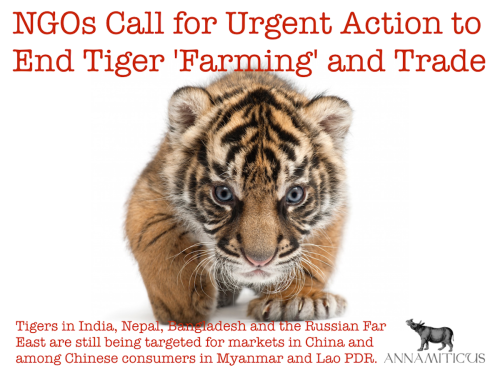
We the undersigned believe that a Zero Demand approach to trade in tiger parts and derivatives is essential to achieve Zero Poaching. This means an end to tiger farming and all domestic and international trade in parts and derivatives of tigers from captive facilities.
That is precisely what the international community called for in 2007; however China, Lao PDR, Thailand and Vietnam continue to keep and breed tigers for trade in their parts and products.
Many facilities that keep tigers are engaged in legal and illegal domestic and international trade in parts and derivatives of tigers that have been bred in captivity, and in some cases in laundering illegally acquired tigers in to the trade. There are an estimated 7000 tigers in captivity in South East Asia and China, and no signs that so-called tiger “farms” are being phased out.
The government of China has authorized a domestic trade in the skins of captive bred tigers for use as luxury home décor and for taxidermy. This stimulates demand for the world’s remaining 3,200 wild tigers instead of reducing it. How can we expect demand-reduction campaigns to work in China if the government itself tells consumers that it is acceptable to buy tiger skins?
Tigers in India, Nepal, Bangladesh and the Russian Far East are still being targeted for markets in China and among Chinese consumers in Myanmar and Lao PDR.
There is also a thriving market in Vietnam and Indonesia. Tigers are not just killed for their skins; their bones are used to brew “tiger bone wine”, their meat is sold as a delicacy, and their teeth and claws are sold as charms.
As reflected by seizures, these end markets are sourced from both wild and captive tigers. So long as legal and illegal trade in tigers from captive facilities continues, demand reduction and enforcement efforts are undermined, wild tigers everywhere are at risk, and the chances of recovery of wild tiger populations in China and South East Asia are minimal.
In 2007, in recognition of the risk posed by tiger “farming” to wild populations, the Parties to the Convention on International Trade in Endangered Species of Wild Fauna and Flora (CITES) decided that “tigers should not be bred in captivity for trade in their parts and derivatives”. Countries with tiger farms e.g. China, Lao PDR, Thailand and Vietnam have failed to implement this decision. Even South Africa has engaged in this lucrative business, and is exporting captive tiger body parts to markets in Asia and elsewhere.
Not enough has been done to investigate the facilities involved, amend laws to end “farming”, destroy stocks of tiger parts and derivatives, and ultimately end demand. A comprehensive assessment of the trade in tigers and other Asian big cats was prepared for the CITES Parties by the IUCN in June 2014. The review highlighted examples of good practice from India, where there are no tiger “farms”, and where over two-thirds of the world’s remaining wild tigers survive.
Tiger “farming” has been allowed to drag on for too long. It is time for more decisive action towards achieving Zero Demand, and to hold accountable those countries that are implicated in tiger “farming” and trade in captive tiger parts and products.
The recent deliberations at the 66th Meeting of the CITES Standing Committee confirm that Parties still want to see an end to trade in tiger parts and derivatives from both wild and captive sources.
Recommendations from this meeting encourage Parties to make better use of forensic technology to investigate the origin of tigers in trade, take effective action against online trade and undertake targeted demand reduction campaigns.
Draft decisions have also been prepared for consideration by the 17th Meeting of the Conference of the Parties that, if adopted, would require Parties to undertake time bound country-specific actions to implement CITES resolutions and associated decisions, including the decision on tiger “farming”.
We urge countries with facilities that keep or breed tigers for domestic or international trade in their parts and derivatives to demonstrate real commitment to tiger conservation by:
- Improving enforcement against captive facilities engaged in illegal trade in tiger parts and derivatives;
- Amending legislation to prohibit legal domestic trade in tiger parts and derivatives from captive facilities;
- Preparing plans to phase out tiger “farms”;
- Destroying stockpiles of tiger parts and derivatives.
The international community must ensure that CITES takes strong action against Parties that do not show meaningful progress in ending tiger “farming”.
- Annamiticus
- Born Free Foundation
- Born Free USA
- Conservation Action Trust
- David Shepherd Wildlife Foundation
- Environmental Investigation Agency
- Sanctuary Nature Foundation
- Satpuda Foundation
- Save Wild Tigers
- Species Survival Network
- The Corbett Foundation
- Tiger Awareness
- Travel Operators for Tigers
- TigerTime
- Wildlife Friends International
- Wildlife Friends Foundation Thailand
- Wildlife Protection Society of India
- Wildlife SOS



![China’s Tiger Trade Conspiracy [Podcast]](https://annamiticus.com/wp-content/uploads/2015/12/BehindTheSchemesEpisode39-150x150.png)
